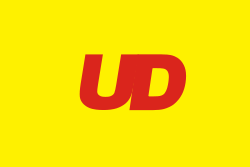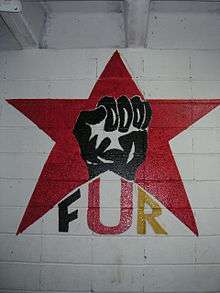Democratic Unification Party
Democratic Unification Party | |
|---|---|
 | |
| Founded | September 29, 1992 |
| Headquarters | Tegucigalpa, Honduras |
| Youth wing | Juventud del Partido Unificación Democrática |
| Ideology | Socialism |
| Political position | Left-wing |
| International affiliation | Foro de São Paulo |
| National Congress |
1 / 128 |
The Democratic Unification Party (in Spanish: Partido Unificación Democrática) (PUD) is a left-wing political party in Honduras. PUD was founded on 29 September 1992 by the merger of four leftist clandestine or semiclandestine political parties, in the context of the changed political situation in Central America at that period, following the end of the Cold War. The PUD was legally recognised in 1993/4 and has fought various elections since 1997, gaining around 1-3% of the vote.
Background
PUD was founded on 29 September 1992, by the merger of four leftist clandestine or semiclandestine political parties, namely Partido para la transformación de Honduras (PTH), Partido Revolucionario Hondureño (PRH), Partido Morazanísta de Liberación Nacional (PMLN) and Partido Renovación Patriótica (PRP). The background of the formation of PUD was the changed political situation in Central America at that period, following the end of the Cold War. Matías Funes was one of the founders of the party.[1]
In Decree No. 189-93 of the National Congress (the Honduran parliament) of 1 October 1993, the state of Honduras legally recognised the PUD. That act was a follow-up of the Esquipulas Accords, by which the Central American governments agreed to give the revolutionary groups in the region possibilities to organize legally and participate in the political process.
Decree No. 92-94 of the National Election Tribunal of 28 January 1994, gave the PUD recognition as the fifth legally recognized political party in Honduras.
Overview

The colours of PUD are red and yellow. Red symbolizes the blood of the martyrs of the struggle and yellow symbolizes the new dawn of Honduras. The banner of PUD is yellow with the letter "UD" in red. The slogan of PUD is UD marca la differencia ("UD [can be interpreted as usted, you] makes a difference").
PUD defines itself as a patriotic, democratic, popular and revolutionary party. The five pillars of PUD are Ethics, Democracy, Criticism, Proposal and Struggle.
The maximum authority of PUD is the National Assembly, which elects the Junta Directiva Nacional. In the departments of the country Department Assemblies are held, which each elects a Junta Directiva Departamental, and likewise on municipal level Municipal Assemblies are held which each elects a Junta Directa Municipal. Under the JDMs are the base units of the party, Colectivos de Base.
Within PUD there are two currents recognized by the National Election Tribunal, Pueblo Unido and Convergencia Popular.
The youth of PUD is called Juventud del Partido Unificación Democrática (JUD). JUD consists of three components, Fuerza Universitaria Revolucionaria (FUR), Federación Nacional de Estudiantes de Secundaria de Honduras (FENAESH) and a movement of Barrio youths.
Electoral record
In the 1997 elections the PUD's presidential candidate was Matías Funes; he polled 23,977 votes (1.21%) in the election. The party received 41,113 votes (2.16%) in the parliamentary elections, and 34,785 votes (1.77%) in the municipal elections. In total one congressional deputy, one member of PARLACEN (the Central American parliament), one mayor and 21 municipal councillors were elected on behalf of UD.
In the 2001 elections PUD again put forward Funes for president; he received 24,075 votes (1.11%). In the congressional election the PUD received 92,818 votes (4.46%), and in the municipal elections, 48,951 votes (2.26%). In total five congressional deputies, one member of PARLACEN and 26 municipal councillors were elected on behalf of UD.
In the 27 November 2005 elections, PUD candidate Juan Ángel Almendares Bonilla won 27,731 votes (1.5%) in the presidential elections. The party received an unknown number of votes in the parliamentary elections and an unknown number of votes in the municipal elections. In total five congressional deputies, an unknown number of members of PARLACEN, one mayor and an unknown number of municipal councillors were elected on behalf of UD.
The PUD was supportive of President Manuel Zelaya in the 2009 Honduran constitutional crisis and the People's Weekly World reported that he was likely to back the PUD's Presidential candidate, Cesar Ham, in the November 2009 election.[2]
Notes
- ↑ "Honduras: Muere ex candidato presidencial Matìas Funes" (in Spanish). Tiempo. 10 February 2015. Retrieved 17 February 2015.
- ↑ "Honduran people resist military coup" People's Weekly World, 29 June 2009.